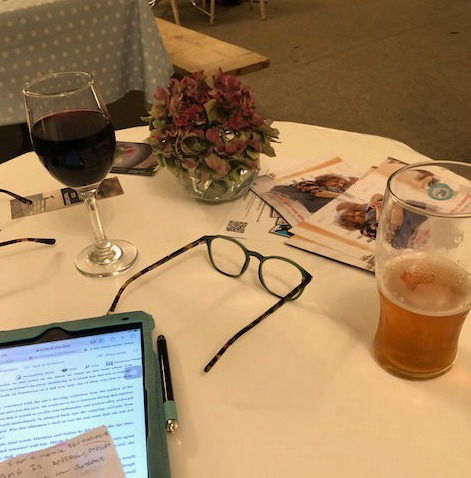
I THOUGHT hard about how my character Michael Morrison would have approached an intense delve into the past with demons to confront. I didn't consider how he would approach reading from his novel at a literary festival.
Twenty years had passed and it seemed so little had changed, yet so much wasn’t the same.
I had been back to Devon on many occasions, but this was a proper return - and one that culminated in my first reading of an extract from my novel The Choreography of Ghosts at the excellent Budleigh Salterton Literary Festival.
There were, in my mind at least, difficulties to overcome during the course of my trip, but it transpired they were more to do with places than people, and I think that's the conclusion Morrison reaches as he researches his second novel Walks Through Weeping Cities and subsequently sets about discovering the truth behind the death of his partner Marianna.
Morrison goes to Italy, I was in Devon, and from Kingsbridge to Plymouth and Exeter to Exmouth, I sought out pubs I used to drink in, places in which I walked and worked and houses in which I lived.
I stared through pub windows, entered old favourites and remembered conversations and events, some of which now mean little or nothing, others which contributed to the shaping of lives.
A turn of a corner to be greeted by the shock of a building I had forgotten ever being in and maybe what happened in there, a light flickering on along the seafront triggering a muscle memory of what appeared at the time to be sad and lonely walks to nowhere, but have since evolved into picture books of the mind, telling stories of opportunities spurned or not noticed, regress, setbacks and progress.
I stared at people I perhaps once knew 20-25 years ago, but couldn’t quite place. A few I did know and could place, and others I perhaps missed by metres or seconds.
The general mapping in my mind was not inaccurate, the structure was similar to how it was but spattered with additions and subtractions which caused confusion and hindered accurate recounting of my ghostly steps in time.
Had I kept a diary would my journey have been more reliable? I don’t think so because, unless it’s a straight recount of your days then, like history, the pages would be dotted with opinion and judgement.
That applies to people and places and it certainly did as bitterness and clouded judgment swallowed my 1990s and dropped both on the wrong side of the dividing line between good and not-so.
It did that to Michael Morrison too, though I promise he is not me.
If I didn’t before, I know now that time puts perspective and meaning to the phrase “old haunts” and I thought about that a lot as I took to the stage (not the main one, as Rev Richard Coles was occupying that at the same time) and read the below section from The Choreography of Ghosts, after a slight digital mishap (that would never have happened to Dickens and he's in the book too - briefly):
Stressed and exhausted, he had rested on the bench on which he had been sitting with Marianna when she had first mentioned the party, shuddering as it struck him that not so long ago their bodies would have made an impression and now only one of them was able to do so.
The painful memories, combined with the sun’s dazzling reflection from the surface of the water, caused him to screw up and close his eyes.
He could never have foreseen during that carefree night they had spent in Padria that it would so swiftly turn unbearably and irretrievably awkward between them and that he would immediately be plunged back into the crippling self-pity from which he had only just emerged.
Was that Marianna’s fault or was the real issue that she was not the person he wanted her to be?
A fragmented version of the final words Marianna said before he left her for the last time, turned away and did not look back remained with him. Maybe they always would.
Nervously pushing her silky, dark, almost black hair away from her face and then once again as it cascaded back down, eventually grabbing a fistful, twisting and tightening it into a coil, she stuttered in her attempt to find the right words, which he now heard as: “Today you know my life is one of deceit. I lied to you because at first I thought nothing would come of us, but then I grew to love you and that is why I show you the truth Michael, even though I realise you cannot understand and I know it will be the finish of us. I needed you to know. I could not lie to you anymore.”
Her face narrowed, cloaked in despair, her brown eyes, maybe through fear, wider than he had seen them before, so deep they were almost black holes, unable to meet his — and she had always met his eye.
He couldn’t figure out her exact emotion; was it crushing sadness, guilt, recognition of defeat, anger with him or another, fear, or the realisation that an end had been reached?